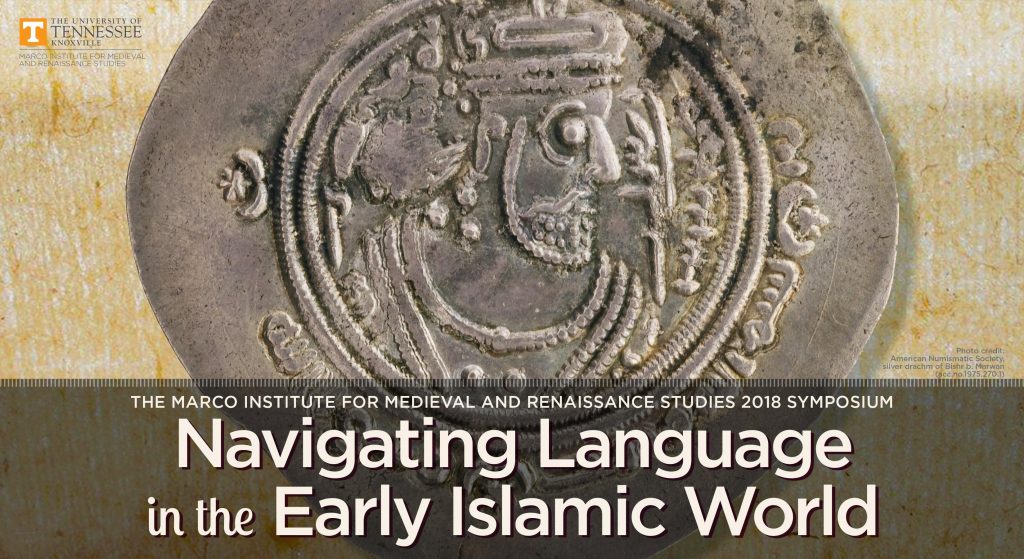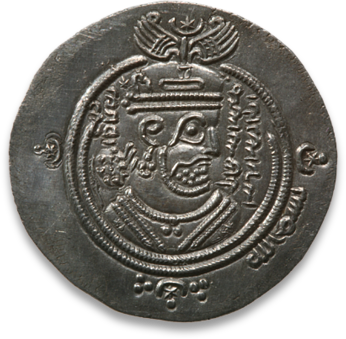April 6-7, 2018
UT International House Great Room
In the last few years of the seventh century, the Marwānid Reforms established Arabic as the administrative language of the Umayyad Caliphate. Coins, inscriptions, and papyri subsequently attest the use of Arabic in caliphal and local administration. Despite the centrality of Arabic as a sacred language to Muslims, the language of the Qurʾān, it was appreciated across religious boundaries such that Christians and Jews quickly began composing and engaging texts in Arabic. Arabic adorns monuments, manuscripts, and clothing, attesting to its broad appeal and high aesthetic value.
Yet despite its centrality, Arabic did not spread evenly or quickly throughout the entire Islamic world. Even though Arabic became a commercial and religious language from Central Asia to the Iberian Peninsula, the populations of many provinces continued to write and converse in other languages such as Persian, Armenian, Coptic, and Syriac, to name a few. This symposium situates the history of Arabic and Arabization within a broader setting of linguistic diversity in the Islamic world in three ways. First, it seeks to understand multilingualism in an ethnically and religiously pluralist environment, including through engagement with studies of the pre-Islamic Near East. Second, it explores the way that communities produced, employed, and transformed Arabic in their own settings. Third, it contributes to the ongoing discussion of textual and oral transmission of narratives and historical accounts between the various languages of the Islamic world.
The 2018 Symposium is organized by UTK professors Manuela Ceballos (Religious Studies), Tina Shepardson (Religious Studies), and Alison Vacca (History), together with Antoine Borrut (History, Univ. of Maryland).
Schedule:
Full detailed program available as a PDF here.
All sessions will take place in the Great Room of the UT International House (1623 Melrose Ave.)
FRIDAY, April 6:
8:45-9:30 Registration and Continental Breakfast
9:30-9:45 Welcome and Opening Remarks by Riggsby Director Jay Rubenstein
9:45-12:15 Session I (Moderator: Tina Shepardson, UTK)
- Muriel Debié (Directeur d’études in Religious Studies, École Pratique des Hautes Études, Paris) – “The Languages of Diplomacy and Religion in the Late Antique Near East: the Arab Tribes and Surrounding Official Languages”
- Khodadad Rezakhani (Associate Research Scholar, Princeton University) – “Pidginisation, Creolisation, and Hybridity: the Interaction of Languages in the Early Islamic East Iran and Transoxiana”
- Petra Sijpesteijn (Professor of Arabic, Universiteit Leiden): “A Policy of Multilingualism in the Early Muslim Empire”
12:15-1:45 Lunch in Black Cultural Center
1:45-5:00 Session II (Moderator: Ryan Lynch, Columbus State)
- Phillip Stokes (Assistant Professor of Arabic, UTK) – “New Perspectives on the Linguistic Landscape of Arabic in the Early Islamic Period”
- Fred Astren (Professor and Chair of Jewish Studies, San Francisco State University) – “‘Abbāsid Book Culture and Ninth-Century Jewish Sectarianism”
- Judith A. Lerner (Research Associate, Institute for the Study of the Ancient World, NYU) – “From Bactrian to Arabic: Seals and Sealing Practices Observed in the Pre-Islamic and Early Islamic Documents from Bactria”
- Alison Vacca (Assistant Professor of History, UTK) – “Language, Power, and Storytelling: Arabic in Caliphal Armenia”
SATURDAY, April 7:
10:00-10:30 Registration and Continental Breakfast
10:30-12:00 Conversations
- Pamela Klasova (Georgetown University)
- Abby Kulisz (Indiana University)
- Kader Smail (University of Maryland)
12:00-1:30 Lunch in I-House Community Room
1:30-4:00 Session III (Moderator: Matthew Gordon, Miami University)
- Aaron Butts (Assistant Professor of Semitic and Egyptian Languages and Literatures, Catholic University of America) – “Intersections between Arabic and Aramaic: The Case of Syriac Christians”
- Marie Legendre (Lecturer of History, SOAS) – “State Representation vs. Practical Use: the Administrative Languages of the Umayyads”
- Antoine Borrut (Associate Professor of History, University of Maryland) – “Towards an Arabic Cosmopolis: Culture and Power in Early Islam”
4:00-5:00 Round Table Discussion

